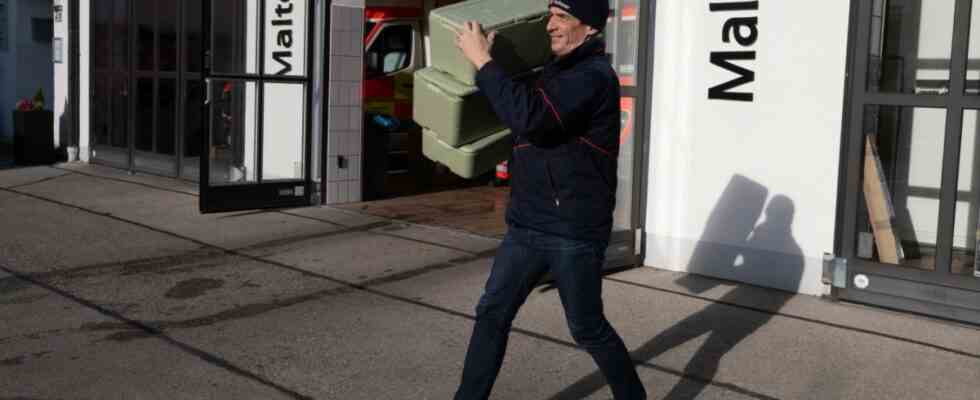Poverty often takes place behind closed doors. This is particularly the case in the district of Munich, the famous suburban belt, in which there are municipalities that are among the richest in Germany. Here people hide their poverty because they are embarrassed not to be able to participate, because they are ashamed that their coat is so old, the apartment is too poor to receive guests and because the fridge is often empty. Anyone who has an eye on the poverty are the drivers of the menu service of the Malteser relief service in Gräfelfing. They bring a warm meal to the needy, if necessary every day. This is financed by the meal sponsorships that were set up because people lack the most important thing in life: food.
When money is tight, the only meal left for the day is bread and jam, as Katrin Dietze says. She organizes the meal sponsorships at the Malteser. Economic poverty always goes hand in hand with social poverty: Those affected no longer go out the door, withdraw, also because every visit to the café and every excursion costs money. Usually there is also a physical limitation, a serious illness or disability. The result is isolation and poverty. There are always destinies that show themselves behind the doors.
The drivers also have a view of the living situation and the condition of their customers
The menu service driver is often the only personal contact people have left. “They wait for him, he sets the daily structure,” says Dietze. The drivers bring the food right into the fridge, they are more than food suppliers, they also have a duty of care. They know their customers and keep a watchful eye on them. If they appear confused, progressively breaking down or if the domestic conditions indicate that someone can no longer manage on their own, the driver gives feedback to the Maltese, who can then take action. Sometimes a house emergency call is financed by the donations from the meal sponsorships, so that people can call for help at home at the touch of a button.
The food waits in a large refrigerated warehouse to be picked up.
(Photo: Catherine Hess)
The idea of the meal sponsorship was born in 2009. The Malteser deliver “meals on wheels” to people who can no longer cook for themselves. It became clear that there are people who not only can afford this service, but who cannot afford a nutritious diet at all. Through the meal sponsorships, they receive warm meals that are financed by donations. A sponsorship costs around 3300 euros per year. This ensures a daily warm main course, which is delivered shock-frozen and reheated in nine minutes in the microwave, which can also be sponsored by donations. If you want, you can also get a soup, salad and dessert. Then the sponsorship becomes a bit more expensive. Companies and private individuals are among the donors. “No one has to take on an entire sponsorship, everyone can donate as much as they want,” says Dietze.
The biggest problem is getting to the people who urgently need the food. They don’t report to the Malteser relief service themselves, they’re too ashamed. It is outpatient care services, social services in the hospital, the family doctor, a neighborhood helper, the pastor or the mayor who make contact. Ex-professional soccer player Paul Breitner has been the patron of the initiative since 2019, and the concept has become even better known since then. Breitner has already accompanied many tours of the menu service and rang the doorbell.
Most people don’t have the money to stock up on supplies for a blackout
Most of their customers received basic security, says Dietze. However, it is not a prerequisite for a meal sponsorship. A pension notice is sufficient. If you have less than 600 euros a month, after deducting fixed costs such as rent and energy costs, you can get a warm meal. Many have “significantly less than 600 euros available”. Women are often affected, who only receive a small pension because they have put their professional life on hold to provide for the family. Or there are widows and widowers who have to live on the small remaining pension of the deceased spouse. Out of shame, many do not even take advantage of additional help such as basic security. The current social report of the district office reveals that there is a large number of unreported cases of hidden poverty in the district. Up to 4000 people who would be eligible do not apply for assistance such as basic security.
Inflation and skyrocketing energy costs add to the worries behind the doors. There is the 82-year-old, who has a 40-year-old refrigerator and fears that the power guzzler will soon make her energy costs unaffordable. There is the other customer, whose only joy is her cat, but she is concerned that soon she will no longer be able to pay for her food. Many are afraid of a power blackout because they cannot stock up on supplies for such cases due to a lack of money. Dietze fears that her clientele will soon be even larger, but that at the same time the willingness to donate to the meal sponsorships will decrease. Should it really become scarce, it would be conceivable to only deliver main courses for a while in order to be able to increase the number of customers. Then there will be no more soup, salad or dessert.
Here’s how you can donate
Advent calendar for good works of the Süddeutsche Zeitung eV
Stadtsparkasse Munich
IBAN: DE86 7015 0000 0000 6007 00
BIC: SSKMDEMMXXX
www.sz-adventskalender.dewww.facebook.com/szaadventskalender

